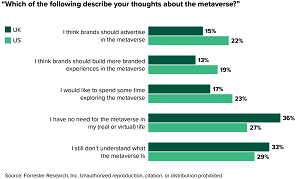News
Research Firm Claims Even Early Tech Adopters Unfamiliar with Metaverse
Despite a huge amount of hype about the still-inchoate metaverse, few are familiar with it, even among early tech adopters.
That's a takeaway from new for-pay research being hawked by tech analyst specialist Forrester.
"Ten months ago, we blogged that consumers weren't ready for the metaverse yet," said Forrester in a blog post published early this month. "Well, the needle still hasn't moved. Just 23 percent percent of US online adults indicate that they're familiar with the metaverse. Elsewhere in the world, the numbers are just as low, if not lower. For instance, a mere 14 percent of online adults in Germany signal familiarity with the metaverse -- ranking them at the lowest of the countries we surveyed." The graphic below shows some thoughts from that study 10 months ago.
 [Click on image for larger view.] Thoughts About the Metaverse (from September 2021 post) (source: Forrester).
[Click on image for larger view.] Thoughts About the Metaverse (from September 2021 post) (source: Forrester).
"In its current state, the metaverse is prime (virtual) real-estate for brands looking to make press headlines, test and learn, and reach a subset of the Gen Z audience," Forrester said in that previous blog post. "Brands that expect a revenue-based ROI from their metaverse custom media buys will be sorely disappointed."
In citing data points from the its more recent Empowered Customer Segmentation report that measures digital readiness, willingness to embrace new technology, self-efficacy and device usage, the company said fewer than half (44 percent) of the most tech-savvy, early-adopter survey respondents were familiar with the metaverse.
The firm concluded that the above data indicates there's much more work to be done "at the top of the funnel" to build out a viable market for the metaverse, which is described by Wikipedia as "a hypothetical iteration of the Internet as a single, universal and immersive virtual world that is facilitated by the use of virtual reality (VR) and augmented reality (AR) headsets." More colloquially, the site says, a metaverse is described as a network of 3D virtual worlds focused on social connection.
"Forrester believes that the metaverse has the disruptive potential to transform the customer experience," the research firm's blog post said. "As such, we're bullish that brands should use this time of metaverse nascency to experiment with extended reality and, while doing so, be strategic, creative, and realistic about their metaverse ambitions. Brands should be sure to:
- Ask "why?"
- Know the audience.
- Respect the community.
- Create a value exchange.
- Iterate for future use cases.
Since March, the firm has published six reports about the metaverse, with more being planned.
About the Author
David Ramel is an editor and writer at Converge 360.